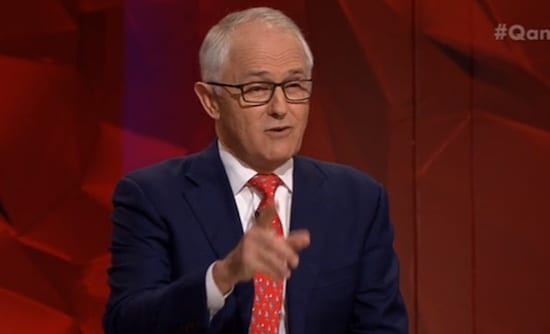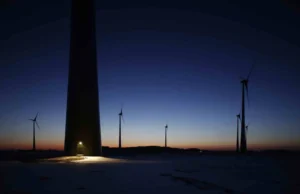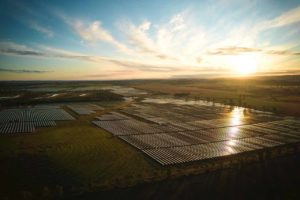Prime minister Malcolm Turnbull has chosen to close the year in much the same way as he started it on climate and energy policy: awaiting yet another review, and parroting the ever more absurd claims of the fossil fuel lobby and the right wing of his Coalition government on energy.
After more than two years at the helm, Turnbull has done nothing to change the policies laid out by his predecessor Tony Abbott, and has only added to uncertainty by canning the major recommendation of the Finkel Review and trying to force the likes of AGL to invest yet more money in their ageing coal fired generators.
In an appearance on ABC TV’s Q&A program on Monday night, on the same day as a series of end-0f-year interviews with mainstream media, Turnbull appeared triumphant, cock-sure and combative, and unwavering from the hard right line on climate and energy.
Asked about his warnings – made in 2010 – that failing to address climate change would endanger future generations, Turnbull predicted a long future for fossil fuels, and repeated the usual fear-mongering about wind and solar.
“We have to ensure that we have affordable and reliable energy. We have to make sure that we keep the lights on, and can afford to keep the lights on,” he said.
“Energy policy has to be driven by engineering and economics, not by ideology, and as we’ve seen, for example, in South Australia, sheer idiocy.
“You know, where you had an enormous investment in wind power – nothing wrong with that, except they didn’t have anything to keep the lights on when the windmills stopped turning. A catastrophe. So you’ve got to plan it right. There will be a role for fossil fuels for a long time.”
But whether Turnbull likes it or not, the idiocy does not lie with Labor in South Australia; it lies with the mind numbing ignorance and obstinacy of the right wing in Australia’s politics and media, forever holding on to their attachment to coal.
The blackout in South Australia proved one thing, that the country’s ageing and dumb grid was no longer fit for purpose, and the solution would not come from last century technologies like coal and gas, but a new system built around wind, solar, smart thinking and new management practices.
The Coalition’s response to wind and solar, and new technologies such as battery storage and smart actions like demand response, betray their own ideology and their lack of respect to both engineering and economics.
Turnbull will be buoyed by the fact that the mainstream media has declared the energy policy issue to be “sorted” – the AFR on Tuesday said the energy policy conundrum was “fixed”, and even the Guardian has suggested any opposition to the proposed National Energy Guarantee is just “playing politics”.
But energy and climate policy is anything but fixed.
Turnbull claims, and did so again on Q&A, that the NEG – currently little more than a thought bubble – has widespread support, but that is only among the incumbents and big business players that stand to profit from it, and their lobbyists and boosters.
The support of others is highly conditional, and is on the basis that the NEG must not look like what the modelling suggests it might look like – useless on emissions, inviting no new investment, doing little on prices, and simply reinforcing the market power of the incumbents.
The lack of scrutiny from mainstream media, and its willingness to parrot Coalition and fossil fuel industry talking points about “clean coal” and “base-load”, will make Turnbull’s task easier and take much of the political risk out of his informal treaty with the technology troglodytes on his right.
But his pursuit of these lines is all the more disappointing because he has plenty of evidence say otherwise:
+ The government’s own modelling suggested that more renewables, not less, would lead to the greatest price reductions;
+ The Finkel report on storage reinforced what the CSIRO and the networks had already made clear, that the level of storage required is remarkably small and almost non-existent for the levels contemplated by this government;
+ And numerous reports put emissions at their ever highest level, point out the uselessness of the current Direct Action policy and the growing risks from global warming.
That’s why the AGL decision on Liddell is significant. A combination of renewables, storage, and some gas peaking plant would slash emissions and offer technology 20 per cent cheaper than the Coalition’s preferred option of spend money keeping ageing and unreliable coal generators on line.
But as the Institute of Sustainable Futures explains, emissions could be cut even further, and costs halved (rather than cut by 20 per cent), if an even smarter approach was adopted – a mixture of renewables and energy efficiency and demand management.
However, as ISF’s Chris Dunstan points out, this does require the government to actually do something, and reframe policy so that utilities have a motive to change their approach and so consumers can benefit.
The sole incentive for the utilities under current market settings is to invest in more generation and continue to extract the monopoly rents from their market dominance that are screwing consumers. This report from the regulator last week underlines exactly how they are doing that.
This makes Turnbull’s latest utterings completely indefensible.
It is no longer good enough to lock himself into the Abbott era policies designed and framed by climate deniers and technology skeptics who sought to do the minimum possible.
(It may be partially explained by the fact that one of his principal climate and energy policy advisors, Sid Marris, used to work for the Minerals Council of Australia. And Patrick Gibbons, the former advisor to environment minister Greg Hunt, is now head of climate and energy at the MCA).
If he wants it, Turnbull has all the evidence he needs to argue that the energy trilemma – emissions, reliability and affordability – is best addressed by wholesale market and policy reform and ambitious renewable and climate targets.
It would lead to a smarter, cleaner, cheaper, and more reliable grid. And in quick time. What’s not to like about that?
The issue over marriage equality showed how reasoned argument, and just a little political and a lot of community leadership, can overcome the fear and loathing of the small but powerful conservative base.
But Turnbull has shown that he has not the courage, nor the political need, to push these through.
Instead, he is likely to push ahead with Snowy 2.0 pumped hydro scheme. Its feasibility study, due to be released soon, will make fascinating reading.
But if climate policies stay as they are, then Snowy 2.0 will not be, as Turnbull claimed on Q&A, “the largest single renewable project in our history since the Snowy Mountains Scheme was built”.
In fact, it won’t be renewable at all, it will simply be using excess coal power at night to push water up hill and then wait for high prices before allowing it to cascade back down again.
And if Snowy 2.0 is built in these circumstances, it will lock in the power of the incumbents, the arrival of zero marginal cost generation from wind and solar will be kept to a minimum, and it won’t just be customers getting screwed, it will be the planet as well.
But that’s the Turnbull we’ve come to know.












